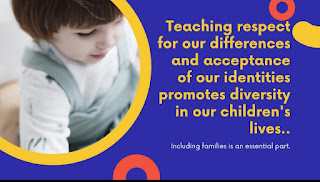Advocating for diversity, equity, inclusion, and justice for positive social change
I hope that in my work with children and families from diverse backgrounds, I can support and respond to their needs, but also change these perspectives about discrimination and oppression. I want to profess respect, inclusion, and understanding among the school community I work for, but first I have to be aware of my own biases against diversity. Being aware of them is the only way I can eliminate them and be mindful of that. I want to be a role model for my students. No microaggressions, no harm! Everyone is welcome, all are included!
As a kindergarten teacher, I support, help, and understand diversity, but also I want to teach diversity to my little students, being a role model and setting an example when I treat and speak all with respect, acceptance, and tolerance. My behavior will teach them how to treat others to create the social change we all want. I also want to create projects working with diversity, equity, inclusion, and social justice with diverse families to benefit all the members of the school community allowing all to learn from these families.
As an early childhood educator, I feel grateful because I have a great opportunity to contribute by sharing ideas, insights, and positive attitudes firsthand with my little students. I assure you that I can contribute to the positive social change our world needs and that makes me feel empowered and committed to these goals.
Leading our thoughts to action
The issues and trends in the early childhood field need voices to speak out to be heard. The field needs advocates to spread the messages of how things need to be done for the wellness of all children and their families. When we think about advocacy, probably we think about politicians or people trying to convince others to do something or to believe in something. But advocacy does not have to be so difficult, and you can do it! As easy as talking to other people in your community or at the workplace, you can make a great change! You can also join organizations that support the early childhood field and go bigger by contacting, writing, and emailing senators, legislators, and policymakers explaining what, how, and why these issues and trends that affect children and families need to be addressed. There are great organizations that promote quality early care and education, including the provision of professional development, advocacy, and community engagement provides excellent information.What you can do
Here are some recommendations to work toward diversity, equity, and social justice following your thoughts and putting them into action that you can do to promote good change.
💡Create an environment that respects and values children's and families' differences.
💡Be aware to minimize bias and recognize inequities reflected in the mission, vision, and values of the program you represent.
💡Fight against oppressive systems in education that nurture and exclude others.
💡Focus on the real issue, which is the well-being of all our students.
💡Work together with colleagues, parents and families, students, and administrators for planning on cultural competency and culturally responsive teaching practices.
💡Find your passion and love for what you believe.
💡Speak out against policies that give injustice and oppression to diverse people.
💡Use social media to cultivate a culture toward positive change.
💡Share the work and voices of others that fight for your same passions.
💡Keep yourself informed about what’s happening on the latest trends related to diversity, equity, inclusion, and social justice for positive social change.
💡Be aware to minimize bias and recognize inequities reflected in the mission, vision, and values of the program you represent.
💡Fight against oppressive systems in education that nurture and exclude others.
💡Focus on the real issue, which is the well-being of all our students.
💡Work together with colleagues, parents and families, students, and administrators for planning on cultural competency and culturally responsive teaching practices.
💡Find your passion and love for what you believe.
💡Speak out against policies that give injustice and oppression to diverse people.
💡Use social media to cultivate a culture toward positive change.
💡Share the work and voices of others that fight for your same passions.
💡Keep yourself informed about what’s happening on the latest trends related to diversity, equity, inclusion, and social justice for positive social change.
As early childhood professionals, parents, and caregivers, we need to emphasize and develop a multicultural awareness sense in our children. In that way, they will be able to identify discrimination and oppression when they experience it in their lives or the lives of others. As a final thought to inspire your thoughts into action, remember that little efforts done by many make a big change in the lives of children and families and the improvement in the early childhood field. You can be an inspiration to others who share your passion. Don't hesitate to spread your word and raise your voice to fight for inclusion, equity, and social justice for all.
You are the change that we need to transform a life. Do not forget that... YOU ARE THE CHANGE!
Reference
Five Ways to Advocate for Justice in Education. (2016, August 11). Teaching Tolerance. https://www.tolerance.org/magazine/five-ways-to-advocate-for-justice-in-education"I WOULD LIKE TO BE KNOWN AS A PERSON WHO IS CONCERNED ABOUT FREEDOM AND EQUALITY AND JUSTICE AND PROSPERITY FOR ALL PEOPLE."
- Rosa Parks, an American activist
_______________________
Diana A. Rivera is an Early Childhood Educator, with graduate studies in Educational Psychologist, and author of Be the voice for children. Diana believes and commits to the healthy development, growth, well-being, and learning of all children. The blog posts share ideas and knowledge about educational psychology, child and brain development, parenting, diversity, effective teaching practices, early childhood education, and care to support the empowerment of children and families.









